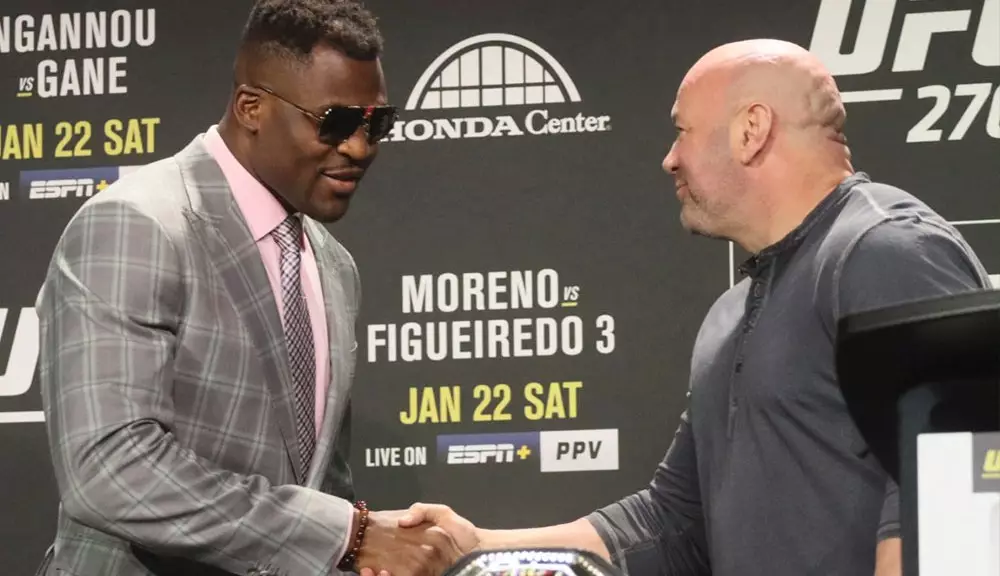The world of mixed martial arts (MMA) is no stranger to drama, and few narratives illustrate this more vividly than the ongoing tension between Francis Ngannou, the former UFC heavyweight champion, and Dana White, the CEO of UFC. The complexities of their relationship have been thrust into the spotlight, revealing a powerful tale of ambition, betrayal, and personal animosity. In light of the recent revelations and exchanges, it becomes imperative to dissect the motives, perceptions, and underlying truths that govern their public feud.
At the core of Ngannou and White’s discord are accusations, miscommunications, and personal grievances that stretch back several years. White’s recent commentary reveals a deep-seated animosity that predates Ngannou’s ascension as heavyweight champion. As outlined in his statements, White claims to have held a personal dislike for Ngannou long before he wore the heavyweight belt, implying that his grievances are rooted not just in business disagreements but personal evaluations of Ngannou’s character.
On the flip side, Ngannou asserts that his departure from UFC was driven by a contract dispute, suggesting that White’s remarks are either misinformed or a calculated attempt to undermine him. This highlights the dual narratives that often emerge in high-stakes situations like these, where each party perceives themselves as the victim, adding layers of complexity to their public personas.
Changing Narratives and the Role of Recency Bias
The nature of how fighters are portrayed during and after their careers is often influenced by recency bias and the evolution of narratives. While White initially touted Ngannou as the “baddest man on the planet,” his more recent comments frame Ngannou in a decidedly negative light, claiming he ran from potential fights, specifically with Jon Jones. This shift not only serves to bolster White’s current standing but also denigrates Ngannou’s legacy. The juxtaposition between being a celebrated champion and an alleged coward illuminates how perceptions can warp over time based on the evolving dynamics in the sport.
Moreover, White’s insistence on Ngannou’s character shortcomings indicates a broader trend in the sports world, where personal integrity and professionalism often mingle uncomfortably with athletic prowess. This raises the question of whether Ngannou’s worth as a fighter should be diminished due to perceived flaws in his character—an argument that sometimes finds favor among fans and critics alike.
Since his departure from UFC, Ngannou’s career trajectory has taken several unexpected turns. His switch to boxing and subsequent losses to prominent figures like Tyson Fury and Anthony Joshua were setbacks that fueled White’s narrative of Ngannou’s supposed decline. However, it is crucial to recognize that these experiences can shape an athlete’s career rather than define it.
In contrast, Ngannou’s successful debut in the Professional Fighters League (PFL), where he secured a dominant victory over Renan Ferreira, starkly contrasts the narrative of failure. Such victories serve as a reminder of Ngannou’s resilience and tenacity, challenging the prevailing assumption that he is washed-up or irrelevant.
A striking aspect of this feud revolves around power dynamics. White’s remarks suggest a desire to maintain superiority over Ngannou, emphasizing his role in shaping fighters’ careers and public personas. White’s claims about having “no sleepless nights” over Ngannou’s departure hint at a spurious exertion of power, portraying the UFC as an entity capable of easily replacing its stars.
This complex interplay extends to the structural nature of fight promotions, where contracts and negotiations often reflect larger themes of control. Ngannou’s decision to pursue opportunities elsewhere can be viewed as a bold reclaiming of autonomy in a sport where fighters frequently face exploitation. By pivoting to PFL, he has challenged conventional wisdom, thereby restoring his agency and potentially influencing the broader landscape of MMA.
Given the depth of their animosity and the personal stakes involved, one has to question whether a reconciliation between Ngannou and White is possible. White’s vehement declarations—like stating that they will “never be in business together again”—may resonate as more than just anger. They may indicate a profound rift, one that cannot easily be mended amidst public disparagement and competitive aspirations.
Ultimately, the saga of Francis Ngannou and Dana White serves as a captivating case study in the intersection of sport, personality, and business. The narratives constructed by both sides reveal insights into human nature, ambition, and the complexities of professional relationships. As these two figures continue to navigate their paths, one thing remains certain: their clash will likely echo through the annals of MMA history for years to come.

